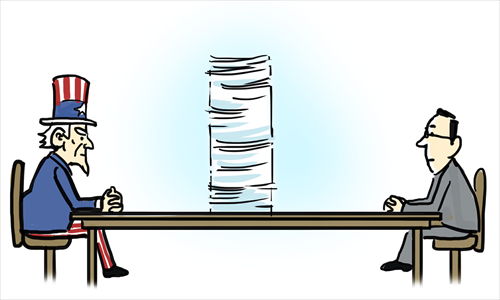Sino-US ties can be reinforced from top down

Illustration: Liu Rui/GT
State visits are not offered lightly. Chinese President Xi Jinping's upcoming state visit in September at the invitation of US President Barack Obama reflects the gravity of what has become the world's most important bilateral relationship. Whether US-China ties are more cooperative or more competitive will be a key factor shaping the world order in the 21st century.
Xi's state visit will be his third major summit with Obama, and given the complexity, current tensions and deep interdependence of the relationship, this follow-up to the November summit in Beijing can hopefully boost the relationship's momentum.
Developing personal relationships between the two leaders is important in three key respects: deepening understanding of each side's goals and expectations; addressing sources of distrust; and providing guidance and a sense of priorities to, and pressure on, the respective bureaucracies charged with implementing the policies.
The November summit was a watershed event that may have changed the tone of the US-China relationship. In the run-up to the APEC meeting, China reduced tensions with key neighbors, Vietnam and Japan, and by emphasizing its "One Belt, One Road" policy and proposing the establishment of the Asian Infrastructure Investment Bank, Beijing shifted the regional focus to its positive role and contribution of public goods to the region.
This set the stage for a similarly substantive and cooperative outcome to the US-China meeting. The list of agreements was long, but certainly cooperation on climate change, committing to reduce greenhouse gas emissions was the centerpiece.
But in light of tensions in the East China Sea and the South China Sea, two agreements made at the summit are of great immediate importance: the Memorandum of Understanding (MOU) on Rules of Behavior for the Safety of Air and Maritime Encounters and a second MOU on notification of major military activities. These confidence-building measures will not resolve core disputes, but they should help manage the growing air and naval traffic in the region, prevent accidental incidents, and foster a less confrontational political climate.
A more stable, cooperative US-China relationship requires demonstrated cooperation on key strategic issues. The Strategic and Economic Dialogue is too big and has become a laundry list for respective bureaucracies to check the box on their issues. What is needed to move the bilateral relationship to a more cooperative mode are breakthroughs on high-priority issues.
High on the list is cyber-security, which Obama identified as an urgent priority in a recent phone call to Xi. Both sides can be accused of transgressions.
But cyberspace is a global commons in which both Washington and Beijing are mutually vulnerable and have an interest in shaping new rules for a domain that in the digital age has become a vital part of both economic and national security.
Another key task for the upcoming summit is to build on and implement recent agreements on two other key strategic issues. Two that are potential game-changers for the bilateral relationship are negotiating a robust Bilateral Investment Treaty (BIT) and strategic cooperation in the Greater Middle East. China has become more active in regard to Afghanistan and in helping Iraq fight the Islamic State terrorist group.
China is dependent on oil from the Middle East and concerned about Islamist terror and regional instability. US-China collaboration in the region would be a powerful demonstration of bilateral cooperation.
Similarly, reaching an agreement on a BIT will help facilitate China's efforts to deepen reform and also deepen the critical economic component of the US-China relationship.
Many in the US wonder whether the new posture adopted by Beijing at the APEC meeting was just a tactical shift or whether it indicates a longer-term change in strategic direction. Concrete progress in these areas would be a good indicator of cooperation becoming predominant in the relationship and a sign that the US and China can reach a modus vivendi where differences are manageable.
The author is a senior fellow at the Atlantic Council. He served as a member of the US Department of State Policy Planning Staff from 2004 to 2008, and on the National Intelligence Council from 2008-12. opinion@globaltimes.com.cn. Follow him on Twitter at @Rmanning4.